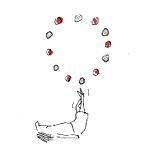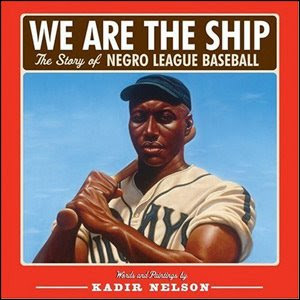My first day in San Diego for Comic Con, I had several hours to kill before I could meet up with my group and get in to the Con. So I walked over the the library and read some comics. Such books in this and the next five are marked like this:

.
070) The Juggler of Our Lady by R.O. Blechman, finished July 22
 Maurice Sendak loves this book. I thought it was okay. Maybe you had to be there, in 1952. I'm not so sure it holds up. Nothing about it seems particularly fresh or original today.
Maurice Sendak loves this book. I thought it was okay. Maybe you had to be there, in 1952. I'm not so sure it holds up. Nothing about it seems particularly fresh or original today.
 just a bit
just a bit069) Waterwise by Joel Orff, finished July 22
 Beautiful, short, black&white meeting of old friends, perhaps for the last time, during a moment liminial for both, in which they merely float. Peppered with flashbacks and dreamy metaphors, this is a quite lovely book.
not long at all
Beautiful, short, black&white meeting of old friends, perhaps for the last time, during a moment liminial for both, in which they merely float. Peppered with flashbacks and dreamy metaphors, this is a quite lovely book.
not long at all068) The Saga of the Bloody Benders by Rick Geary, finished July 22
 As I suspected, The Bloody Benders is the best of Geary's Victorian Murder series that I have yet read. It ended up being an apropos choice as Geary's art graced the official Comic Con publications I would be carrying around the rest of this week.
The Benders were a serial-killing family of which I knew nothing before reading an excerpt of the book in the most recent Best American Comics. I think my unfamiliarity with the tale added to my enjoyment, but Geary's straightforward reporting and distinctive art are always a pleasure in and of themselves.
not much
As I suspected, The Bloody Benders is the best of Geary's Victorian Murder series that I have yet read. It ended up being an apropos choice as Geary's art graced the official Comic Con publications I would be carrying around the rest of this week.
The Benders were a serial-killing family of which I knew nothing before reading an excerpt of the book in the most recent Best American Comics. I think my unfamiliarity with the tale added to my enjoyment, but Geary's straightforward reporting and distinctive art are always a pleasure in and of themselves.
not much067) 10 Books That Screwed Up the World (And 5 Others That Didn't Help) by Benjamin Wike, Ph.D., finished July 21
- Wiker starts, before getting into his ten, with four "Preliminary Screw-Ups. He doesn't like Machiavelli, Descartes, Hobbes and Mill. And while he has fairly reasonable reasons for not liking them, his rhetoric got harder and harder to stomach. He rails like an am radio host and even when his logic was unassailable and even though I almost always agreed with him, I was put of by his disdain. And, basically, for all their other intellectual and moral sins, the great sins of these four in Wiker's opinion (and all the authors in the book) is that they are atheists. Atheism is the true evil on display in this book.
(I will say, having read this book, that I can now make the obvious rejoinder when people say they don't like religion because it has killed so many people, viz. atheists like Hitler, Lenin, Stalin, Mao, Pol Pot, etc, were the greatest butchers in human history. So giving up on god doesn't really seem to have solved any problems.)
Anyway, I was just about to put this book down when he started mentioning Nietzsche and then he drew me back in. See, unlike the other authors in this book, Wiker respects Nietzsche. Why? Because Nietzsche doesn't shy away from any of the amoral implications of atheism. And so while Wiker is happy to agree with Nietsche when he calls himself the Anti-Christ, he respects his intellectual integrity.
Some of the authors Wiker goes for are easy targets --- I mean, is there anyone left who really takes Freud or Kinsey or Sanger seriously? And others, like the essay on Darwin's Descent of Man, were actually quite enlightening. It's interesting how my high school textbooks made pains to say Darwin wasn't in favor of eugenics when his statements to the contrary are methinks-the-lady-doth-protest-too-much at best. And I had no idea Margarent Mead's work was so . . . shaky, shall we say.*
Anyway, if you can put up with his overthetop rhetoric this is a nice place to start. Just don't expect evenhandedness. The author Has An Agenda and is not afraid to push it.
(But I still don't think Utilitarianism as commonly understood is such a terrible thing.)
couple weeks
066) We Are the Ship: The Story of Negro League Baseball by Kadir Nelson, finished July 11
 Nelson's paintings are what he is (rightly) known for, but the text in this book is also excellent. He made the brilliant choice of writing in third-person plural, from the point-of-view of the players which works marvelously.
The characters are heroic and the hyperbole can bump up against itself (Cool Papa Bell was so fast, no catcher could stop him from stealing; Biz Mackey had such a strong arm, no one could steal when he was catching), but that's okay: This is baseball. It is the American sport, people with heroes who are larger-than-life by definition.
Why do think baseball 'roids make us so much madder than in any other sport?
couple hours
Nelson's paintings are what he is (rightly) known for, but the text in this book is also excellent. He made the brilliant choice of writing in third-person plural, from the point-of-view of the players which works marvelously.
The characters are heroic and the hyperbole can bump up against itself (Cool Papa Bell was so fast, no catcher could stop him from stealing; Biz Mackey had such a strong arm, no one could steal when he was catching), but that's okay: This is baseball. It is the American sport, people with heroes who are larger-than-life by definition.
Why do think baseball 'roids make us so much madder than in any other sport?
couple hoursPreviously:
-
065) Hooper Haller by Dean Hughes, finished July 18
064) Stay (MS) by Moriah Jovan, finished July 15
063) The Question: The Five Books of Blood by Greg Rucka et al, finished July 14
062) Daisy Kutter: The Last Train by Kazu Kibuishi, finished July 13
061) Gravity vs. the Girl by Riley Noehren, finished July 11
060) The Dud Avocado by Elaine Dundy, finished July 1
059) Letters from a Nut by Ted. L. Nancy, finished June 21
058) The Tales of Beedle the Bard by J.K. Rowling, finished June 21
057) Lowboy by John Wray, finished June 16
056) One silent sleepless night by Spencer W. Kimball, finished June 14
055) Blue Beetle: Boundaries by Sturges/Albuquerque/Coelho, finished June 6
054) [title in flux] (MS) by B.G. Christensen, finished June 5
053) Invincible Volume 1: Family Matters words by Robert Kirkman, pictures by Cory Walker, finished June 3
052) Der Ostwind (MS) by Kohl Glass, finished June 2
051) The Rumpelstiltskin Problem by Vivian Vande Velde, finished June 2
050) The Bible Salesman by Clyde Edgerton, finished June 2
049) Superman / Madman Hullabaloo! by the Allreds, finished May 29
048) Beyond Fair Chase: The Ethic and Tradition of Hunting by Jim Posewitz, finished May 26
047) Brave and the Bold: Demons and Dragons by Mark Waid et al, finished May 20
046) Atonement by Ian McEwan, finished May 20
045) Love and the Light: An Idyl of the Westland by Orson Ferguson Whitney, finished May 20
044) Tales Of The Batman: Tim Sale by Tim Sale and some motley group of writers, finished May 17
043) Catwoman: The Dark End of the Street by Ed Brubaker et al, finished May 13
042) Aztek - the Ultimate Man by Grant Morrison), Mark Millar, Keith Champagne, Steven Harris; finished May 11
041) Cypher by Brad Teare, finished May 7
040) My Faith in Frankie by Mike Carey, Sonny Liew, Marc Hempel, finished May 5
039) Janes in Love by Cecil Castellucci and Jim Rugg, finished May 5
038) Batman: R.I.P. by Grant Morrison et al, finished May 4
037) 1000 Steps To World Domination by Rob Osborne, finished May 4
036) 110 Per¢ by Tony Consiglio, finished May 4
035) Mendoza in Hollywood by Kage Baker, finished May Day
034) All Star Superman, Vol. 2 by Grant Morrison, and Frank Quitely and Jamie Grant, finished April 22
033) All Star Superman, Vol. 1 by Grant Morrison, and Frank Quitely and Jamie Grant, finished April 20
032) Bound on Earth by Angela Hallstrom, finished April 19
031) Batman: The Resurrection of Ra's Al Ghul by Grant Morrison and colleagues, finished April 18
030) Madman Atomic Comics Volume 2 by Mike Allred with Laura Allred, finished April 14
029) For a Good Time by K. Voss, finished April 11
028) The Greatest Batman Stories Ever Told, finished April 11
027) Fahrenheit 451 by Ray Bradbury, finished April 6
026) Elegant Enigmas: The Art of Edward Gorey by Karen Wilkin (essay) and Edward Gorey (art), finished April 5
025) Owly: A Time to be Brave by Andy Runton, finished April 1
024) Blue Beetle: Endgame by John Rogers and Rafaele Albuquerque, finished March 29
023) Blue Beetle: Reach for the Stars by Rogers, Torres, Albuqerque; finished March 26
022) The Complete Peanuts 1967-1968 by Charles M. Schulz, finished March 25
021) Blue Beetle: Road Trip by various, finished March 25
020) Love That Dog by Sharon Creech, finished March 18
019) Weetzie Bat by Francesca Lia Block, finished March 17
018) The Proviso by Moriah Jovan, finished March 16
017) An Ensign to the Nations: History of the Oakland State
the first five, 1-5
the second five, 6-10
the third five, 11-15
the fourth five, 16-20
the fifth five, 21-25
the sixth five, 26-30
the seventh five, 31-35
the eighth five, 36-40
the ninth five, 41-45
the tenth five, 46-50
the eleventh five, 51-55
the twelfth five, 56-60
the thirteenth five, 61-65
.png)
I have not read Wiker, but I have read Descartes (doesn't seem to be an atheist to me-rather he credits God with the benevolence of giving him his senses so that he may reason and find truth)
ReplyDeleteI have read THE PRINCE several times and never came away think Machivelli was an atheist, aybe I'm not remebering it well enough but I sure don't recall getting that impression. Ruthless sure, morally ambivelint sure, but atheist i just do not recall.
Decent points about the genocidal dictators, though I would argue Hitler belived in a god even if he wanted to become that dark and bloody god himself. Too much occult connections for me not to think he believed in something supernatural.
Still ilike readding books like Wiker's if only to reevaluate what it is I believe and think about most anything.
So I got the 10 books that screwed up the world book as a Christmas present a while ago. The rhetoric was too much for me, I didn't make it through the book. As you described, it sounds like AM radio...
ReplyDelete.
ReplyDeleteDescartes proved the existence of God by showing that he could imagine him, making God a figment of his imagination.
Machiavelli said to pretend to be religious and Wiker says anyone who can give that advice (as well as his no-fear-of-hell other advice) can't be a believer.
I like your take on Hitler, David. Now there's a novel.
RC: And now you'll never have to.